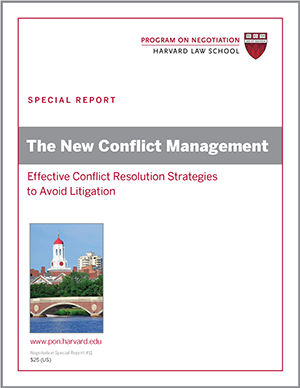
In a Journal of Research in Personality article by Hillary Anger Elfenbein (Washington University in St. Louis), Jared R. Curhan and Lucio Baccaro (Massachusetts Institute of Technology), Noah Eisenkraft (University of Pennsylvania), and Aiwa Shirako (University of California at Berkeley), researchers revealed their discovery when they tried to determine what differences potentially lead to different negotiation outcomes.
Although Elfenbein and her colleagues have found that negotiators perform at a similar level from one negotiation to the next, to their surprise, these scores were only minimally related to specific personality traits. And traits that are basically unchangeable, such as gender, ethnic background, and physical attractiveness, were not closely connected to people’s scores.
A small number of traits did affect negotiators’ performance,however. Let’s look at the qualities that stood out in this study, as well as some that other researchers have identified.
1. Beliefs about negotiation.
Do you view negotiation as an innate skill or one that can be learned? Some of us think that we can improve your negotiating ability, and others believe there’s little hope of improving our skills, researchers Laura Kray of UC Berkeley and Michael Haselhuhn of the University of Pennsylvania have found. These beliefs make a difference. If you think people can improve their negotiation skills, you’re likely to outperform those who believe negotiation prowess is innate, according to their research and the Elfenbein study.
It seems that simply being aware that you can improve your results can have a positive impact on your talks—good news for readers of Negotiation Briefings. Research also finds that those who approach negotiations with a positive attitude and high expectations tend to perform well.
2. Selfishness and selflessness.
Perhaps unsurprisingly, negotiators in the Elfenbein study who were most concerned about their own outcomes achieved higher performance scores than other negotiators.Other experiments have compared “proself ” negotiators, individualists who focus primarily on their own outcomes and competitors who want to “beat” the other side, with “pro socials,” those who focus on maximizing outcomes for both parties. Several studies show that in many contexts, prosocial are more generous than proself toward others.
But in one study, pro-selfs made more concessions than did pro-socials when their counterparts expressed disappointment with offers, professors Gerben A. vanKleef (University of Amsterdam) and Paul A. M. van Lange (University of Amsterdam).
Why were these selfish negotiators responsive to the other side’s needs?
Ironically, to improve their odds of reaching agreement—and thus to further their self-interest. Contrary to intuition, selfish negotiators appear to be fully capable of detecting their counterparts’ emotions because of the potential benefits to themselves.
3. Intelligence and creativity.
You might assume that negotiators with high IQs would routinely outfox their counterparts, but that’s not necessarily the case. In the Elfenbein study, highly intelligent negotiators created more value than others, but they also claimed slightly less value for themselves.
As a result, intelligence didn’t significantly affect negotiators’ performance. Similarly, negotiators who scored high on creativity measures were adept at uncovering innovative tradeoffs on issues, but their overall scores did not rise above average. These findings back up a 1998 study of individual bargaining differences by professors Bruce Barry And Raymond Friedman of Vanderbilt University, who found that very smart negotiators were good at creating opportunities for joint gain but did not have an edge when dividing the pie of resources.
4. Sensitivity to slights.
When you criticize a negotiator’s argument or question her motives, you risk threatening her “face,” or social image. Such direct threats to self-esteems trigger embarrassment, anger, and competitive behavior in your counterpart, according to Judith White (Dartmouth College), Renée Tynan (University of Notre Dame), and Adam Galinsky and Leigh Thompson (both of Northwestern University).
Some people are more sensitive to slights than others, White and colleagues have learned.
These thin-skinned, self-conscious individuals work hard to control the way others perceive them.
What happens when slight sensitive people negotiate?
When they negotiated as sellers in one simulation, they were twice as likely as others to declare impasse even though agreement would have benefited both sides. Interestingly, these prickly negotiators did not overreact when they played the role of buyer in the same simulation.
The researchers concluded that when slight-sensitive people are personally invested in an issue being negotiated—for instance, when they’re selling a family heirloom or interviewing for a job—they are susceptible to feeling threatened and, as a result, behave competitively.
How do you think personality effects negotiations?
Related Article: Negotiation Skills – Are You Ready to Negotiate?
Adapted from “In Negotiation, How Much Do Personality and Other Individual Differences Matters?,” first published in the December 2008 issue of the Negotiation newsletter.




